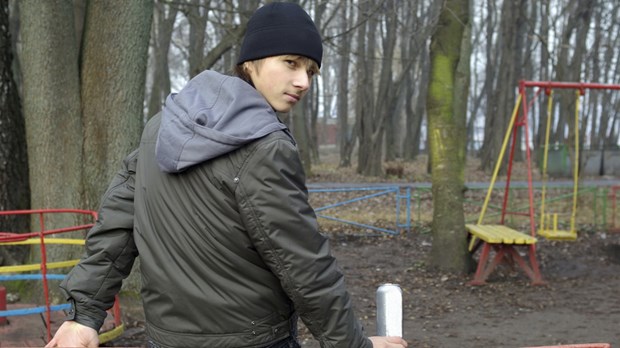When Your Child Drinks

"It's not my alcohol, Mom. I'm just keeping it for a friend."
As a counselor who has worked with teenagers for more than 20 years, let me tell you the truth: Those words aren't it. Teenagers can come up with a million excuses for whose alcohol you've just discovered in their room and why they have it. When it's your child, you'd much rather believer a lie than the painful truth that your child has been drinking.
The lies didn't start with the cover-up either. They started at the beginning: the very first time your child purchased alcohol from an older high school student or even drank the first sip at a party. As alcohol experimentation gets heavier, so does the lying. They're crafty, these teenagers. A group of high school students told me just last week that there are now bras made with special pouches to hold alcohol. There are even fake tampons that are really just very small flasks! They carry it in water bottles and disguise it in antibacterial hand gel containers. There's no shortage of ways teenagers using alcohol or drugs can pull the wool over their parents' eyes.
Three critical factors
At our counseling ministry, we tell parents often that there are three reasons teens may choose not to experiment with drugs and alcohol:
-
They have their own sense of faith that drives them to make good choices.
-
They have a group of friends who are making good choices and applying positive peer pressure.
-
They're terrified of being caught and punished by their parents.
As a parent of a teen, you want to do what you can to have all three principles in place. Encourage your adolescent to participate in a small group where he can be influenced by peers and grow in his own relationship with Jesus. As the teenagers around him start to drink or use drugs, clearly communicate ahead of time the consequences for making poor choices. Follow through if your child violates the boundaries. If your response is strong and communication is open within your family, you can effectively stop the experimentation. But if it isn't stopped? The experimentation can accelerate into a problem . . . and quickly.
Addiction, secrecy, and shame
With adult children, it's not quite so simple. You can't keep an eye on your college-aged son. You can't choose a small group for your 20-something daughter to share and learn about Jesus. You can help your children find a church, but you have no way to make sure their cars actually drive to it on a Wednesday night rather than to the nearest liquor store.
No matter what the age, addiction is much the same. It's enshrouded in lies. It lives in secrecy simply so it can continue. Young adults carry alcohol in water bottles too. They hide bottles in toilet tanks and the trunks of their cars. Drugs are even easier to hide and, in some states, no longer have to be hidden. But experimentation usually leads to heavier use, which often leads to abuse. Substance abuse, at every age, is accompanied by lies. And the lying just perpetuates an even deeper problem for an addict: shame.
Shame is no respecter of ages. Your son makes a bad decision and no matter what degree of bravado he displays, deep down he doesn't want you to be disappointed in him. Your adult daughter drinks another beer "to take the edge off" the chaos of five children at home and then is humiliated when she yells at her four-year-old daughter and brings her to tears again. The shame accompanies the drinking or the using, but then more using is "necessary" to cover up the shame.
In her honest and illuminating book Little Black Sheep, Ashley Cleveland recounts her own battle with addiction, saying, "This combination of outside forces provided my solution, my way of tolerating myself, of feeling different and uninhibited. But my lack of inhibition led to embarrassing behavior that reinforced my self-loathing and pushed it past the tipping point where I could not stand being in my own skin without a stiff drink, and thus the cycle would begin again."
Taking action with your teen
So, what do you do? How do you respond to children when they've been using or abusing drugs or alcohol?
If it's your underage child who has been experimenting with drugs or alcohol, consider these principles for taking action:
1. Give your child consequences, even for a first-time offense. Adolescents tend to live in the moment, so believe in intense, short-term consequences for your teenager. (When your child is grounded for an extended period like six months, it's often less effective; she usually doesn't even remember why she was grounded by the end of the punishment.) Choose a consequence like taking away all technology for a month. Then slowly allow her to start back with a limited amount of trust and privileges, building on that as she proves herself responsible.
2. Give your child hope. If he feels he can't earn back your trust, he'll often give up and sneak his way back to the very behavior you want him to avoid. Have him serve his consequences, but then give him a chance to prove himself again.
3. Lengthen the consequences with each subsequent offense. For repeat offenders, if fear of being punished is the only factor you can control, then it can be a healthy kind of fear for your child to have.
4. If you feel that your child has a problem, seek professional help. If your child is repeatedly getting into trouble, she is often running from some type of emotional pain. You may need the help of an outside voice, such as a counselor specializing in substance abuse, to step in and help with the situation. Your church will typically have a list of Christian counselors in the area. Research the counselor or site before you go to make sure that the counselor is experienced and a good fit for your child. And then follow the counselor's experienced lead in what he or she recommends.
Taking action with a young adult child
If you're concerned about your young adult child, try taking these steps:
1. Express your concern. Stick to the facts and don't get bogged down by emotion. If you attack or overreact, he often will too.
2. If the behavior persists, pull in outside help. Gather a group of trusted friends and family members to lovingly confront the person. Keep the conversation factual rather than emotional. Provide specific instances when your child's behavior has hurt you. Help her come up with a plan she can enact immediately for help, such as attending AA meetings, counseling, or even inpatient treatment. A counselor can be instrumental in planning and conducting a meeting of this type, often called an intervention.
3. Nagging doesn't help—consequences do. You may need to have short-term or even long-term consequences with your young adult child. For example, if you are at his home and he drinks too much, you may need to leave right away. You may even need to separate yourself from him until he is willing to get help.
4. Allow your child to experience the consequences. Don't rescue her or try to hide the problem. Don't call into work because she has a hangover. Don't come up with stories so that she isn't embarrassed in front of family or friends. She will have to own her problem in order to get better. Rescuing her indirectly communicates that it's your problem just as much as it is her. And, although the problem affects you, you cannot get help for your child. She'll have to do that for herself.
5. Don't try to guilt your child into changing his behavior. Guilt only produces more shame, and shame will likely exacerbate the behavior. Shame will drive your child deeper into hiding, and the way he is choosing to hide is in alcohol or drugs. Saying something like "If you loved me, you'd stop" only makes your child feel like he has let you down again. Give him hope and remind him that you believe he's capable of getting better.
6. Do what you can to understand your child and her choices. Read books such as Addiction and Grace, by Gerald May and Little Black Sheep by Ashley Cleveland. If you're concerned about your child, read parenting books such as Wild Things by Stephen James and David Thomas and Raising Girls by Melissa Trevathan and myself. Attend an Al-Anon meeting. Talk to a counselor, for yourself and for your child. As you understand more of what drives your son or daughter, it will help you know better how to offer love and support through this time.
7. Do all you can to be a godly parent. In a parenting conference that my friends Melissa Trevathan, David Thomas, and I lead, Melissa encourages parents to focus on doing all they can to be godly parents rather than all they can to raise godly children. She follows that with a gentle reminder that parents are not in control. Parents can't directly change the heart of their child, and you can't directly change the heart or behavior of yours either. But you can live in a way that inspires your child to hunger after Jesus and love in a way that frees from shame and invites your son or daughter to know the truth of God's deep love.
When you're facing the pain of watching your child use or abuse alcohol, take comfort and guidance from God's example: "Watch what God does, and then you do it, like children who learn proper behavior from their parents," Ephesians 5:1–2 reminds us. "Mostly what God does is love you. Keep company with him and learn a life of love. Observe how Christ loved us. His love was not cautious but extravagant. He didn't love in order to get something from us but to give everything of himself to us. Love like that" (The Message).
Sign up for TCW's free ParentConnect e-newsletter for weekly updates and help and encouragement for raising the next generation of Christ-followers.
Sissy Goff, M.Ed., LPC-MHSP is an author, speaker, and the Director of Child and Adolescent Counseling at Daystar Counseling Ministries in Nashville, Tennessee. You can follow her at her blog www.RaisingBoysAndGirls.com.
Read more articles that highlight writing by Christian women at ChristianityToday.com/Women
 Read These Next
Read These Next
 Christians and MarijuanaIf pot is legal, does that mean it's okay?
Christians and MarijuanaIf pot is legal, does that mean it's okay? AlcoholSooner or later, your kids will be faced with the temptation to drink. Here's how to help them make the right decision
AlcoholSooner or later, your kids will be faced with the temptation to drink. Here's how to help them make the right decision
 Women's Ministry MythsIt's more than just craft fairs and cupcakes—deep friendships and heart work happen too
Women's Ministry MythsIt's more than just craft fairs and cupcakes—deep friendships and heart work happen too








 Homepage
Homepage
